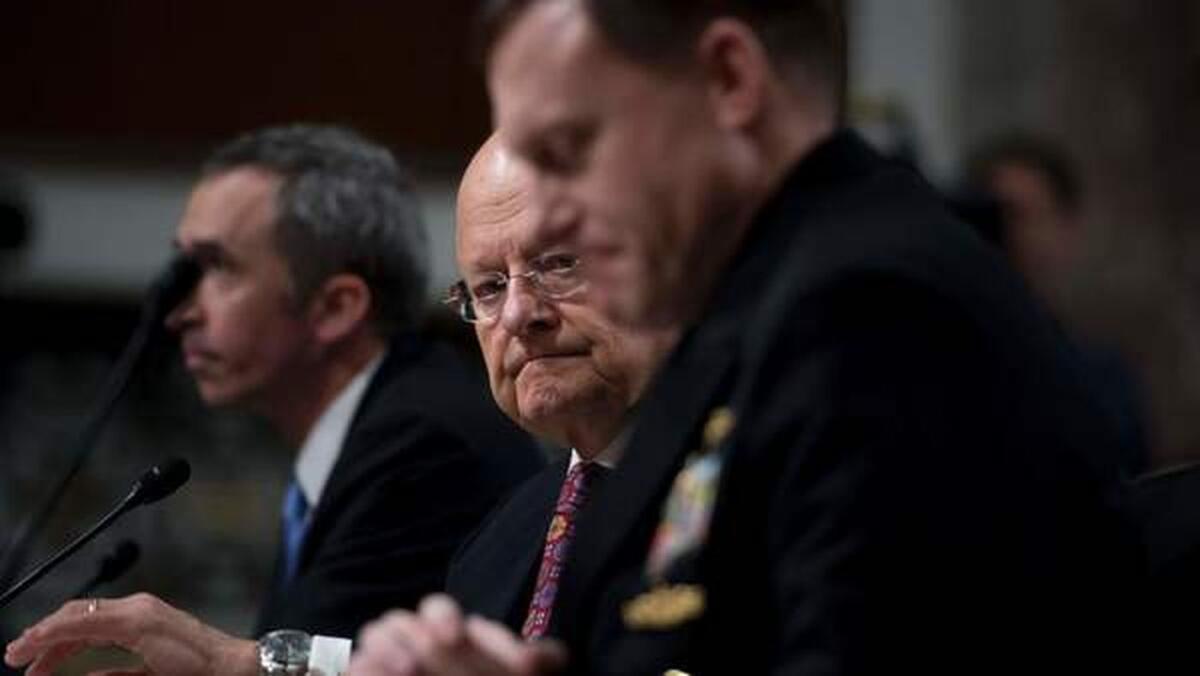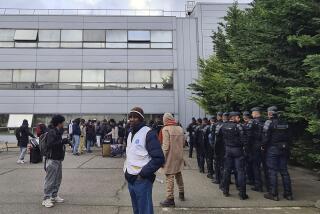13 former U.S. spy chiefs accuse Trump of trying to stifle free speech and politicize intelligence

In a remarkable rebuke to President Trump, 13 former U.S. intelligence chiefs have signed a harshly worded letter in support of former CIA Director John Brennan after Trump abruptly revoked his security clearance.
“We feel compelled to respond in the wake of the ill-considered and unprecedented remarks and actions by the White House,” reads the letter from the officials, who served both Democratic and Republican presidents.
They called Trump’s action “inappropriate” and “deeply regrettable.”Signing the letter Thursday was a virtual who’s who of American spy chiefs dating back to the late 1980s, a striking show of solidarity from the top ranks of the national security establishment.
They included former directors of central intelligence William Webster, George Tenet and Porter Goss; former CIA directors Michael Hayden, Leon Panetta and David Petraeus; former Director of National Intelligence James Clapper; and former deputy CIA directors John McLaughlin, Stephen Kappes, Avril Haines, David Cohen and Michael Morell.
Robert Gates, the former CIA director and secretary of Defense, signed on to the letter Friday morning. Having served Republican and Democratic presidents, Gates is known for staying out of the political arena. His addition to the bipartisan list only served to underscore the alarm in national security circles following Trump’s punitive swipe at Brennan, seen by many as little more than an attempt to silence his enemies.
Leaving the White House for a trip to New York, Trump told reporters Friday he’s gotten a “tremendous response” since revoking Brennan’s clearance.
He also blasted the special counsel investigation into Russian collusion and obstruction of justice as “a rigged witch hunt,” claiming that many intelligence officials involved in it should be under investigation themselves.
“They should be looking at the other side,” Trump said. He singled out Justice Department official Bruce Ohr, the only current government employee whose security clearance the White House claimed Wednesday to be reviewing. Ohr was an early Justice Department contact of Christopher Steele, the private investigator whose dossier on the Trump campaign’s Russia connections was a cornerstone of the government’s initial investigation. Ohr’s wife also once worked for the firm that compiled the dossier.
“Bruce Ohr is a disgrace,” Trump said, hinting that he would strip more security clearances soon. “I suspect I’ll be taking it away very quickly.”
The letter from the 13 former intelligence officials followed an angry open letter to Trump from retired Adm. William McRaven, who headed U.S. Joint Special Operations Command and oversaw the 2011 raid that killed Osama bin Laden. In an op-ed published by the Washington Post, he excoriated Trump’s “McCarthy-era tactics” and said he would “consider it an honor” for Trump to revoke his security clearance in solidarity with Brennan.
White House Press Secretary Sarah Huckabee Sanders announced Wednesday that Trump had stripped Brennan of his security clearance, and therefore his access to classified information.
Trump did so, she said, because of questions about his “objectivity and credibility” and his “erratic conduct and behavior.”
In his statement, Trump said he also was considering revoking security clearances for other critics, including Clapper and Hayden, former national security advisor Susan Rice, former FBI Director James B. Comey, and former FBI or Justice Department officials Sally Yates, Andrew McCabe, Lisa Page and Peter Strzok, as well as Ohr. Several of them have said they no longer have clearances.
Brennan has been an vociferous critic of Trump, and the president’s action was widely seen as an effort by the White House to punish a political enemy. Normally senior intelligence officials keep their clearances in case their expertise is needed, and some use it to obtain lucrative jobs in the private sector.
It’s not clear whether Brennan, who headed the CIA during President Obama’s second term, has used his since he left the agency in 2017. He works as a paid security analyst for NBC News.The 12 former intelligence chiefs praised Brennan as “enormously talented, capable and patriotic,” and dismissed allegations of any wrongdoing as “baseless.”
“The president’s action,” they wrote, “has nothing to do with who should and should not hold security clearances — and everything to do with an attempt to stifle free speech.”
“You don’t have to agree with what John Brennan says (and … not all of us do) to agree with his right to say it, subject to his obligation to protect classified information,” they wrote.
In volcanic tweets, Brennan excoriated Trump as “treasonous” after the president’s lengthy private meeting with Russian President Vladimir Putin last month. Earlier this week, he called Trump “dangerous to our nation” and “the most divisive president we have ever had,” one who has “badly sullied the reputation of the office of the presidency.”
On Friday, Trump pushed back on the notion that he was restricting Brennan’s right to free speech.
“There’s no silence,” he said to reporters on the South Lawn of the White House. “If anything, I’m giving him a bigger voice.” Trump said he’s “never respected” Brennan, but added that he was happy about drawing more attention to the former CIA director. “Many people don’t even know who he is, and now he’s a bigger voice, and that’s OK with me, because I like taking on voices like that.”
That off-the-cuff comment seemed, to some, to indicate that Trump views the outspoken Brennan as a useful avatar.
“Trump relishes Brennan as a strawman,” former CIA operative John Sipher wrote on Twitter. “He can hold him up as the bogeyman Deep State. Brennan’s over-the-top comments help Trump.”
The strongly worded response of the typically measured and apolitical intelligence officials in his support stood in stark relief to that of senior Republicans in Congress. Many said Brennan deserved to have his clearance revoked in light of his unrelenting criticism of the president.
Unafraid of the political repercussions that could imperil Republican lawmakers who criticize Trump, the retired national security chiefs placed the president’s actions in the context of their vast collective experience in government.
“We have never before seen the approval or removal of security clearances used as a political tool, as was done in this case,” they wrote. “Beyond that, this action is quite clearly a signal to other former and current officials. As individuals who have cherished and helped preserve the right of Americans to free speech — even when that right has been used to criticize us — that signal is inappropriate and deeply regrettable.”
They continued: “Decisions on security clearances should be based on national security concerns and not political views.”
Although the White House initially said that the president’s decision was based on national security concerns, Trump — and a clerical error by the staffer tasked with disseminating the statement to the press — indicated otherwise.
In an impromptu interview with the Wall Street Journal shortly after Wednesday’s announcement, Trump indicated that his action toward Brennan was tied to the Russia investigation.
“I call it the rigged witch hunt; [it] is a sham. And these people led it,” Trump told the newspaper. “So I think it’s something that had to be done.”
Additionally, the president’s statement that the White House emailed to reporters was dated July 26, a sign that it was drafted weeks ago and, despite the supposed national security concerns, was delayed until this week — when Trump was reeling from a series of revelations by former aide Omarosa Manigault Newman.
UPDATES:
9:20 a.m.: This article was updated with comments Friday from President Trump.
7:30 a.m., Aug. 17: This article was updated with former CIA Director Robert Gates becoming the 13th former spy chief to sign the protest letter.
This article was originally published at 10:05 p.m., Aug. 16.









